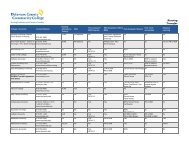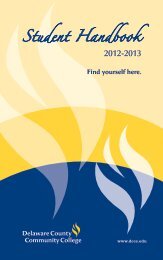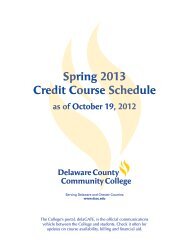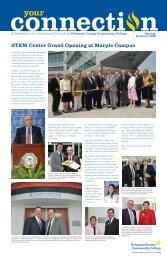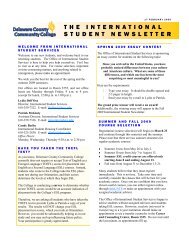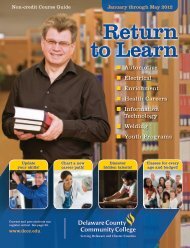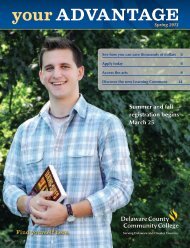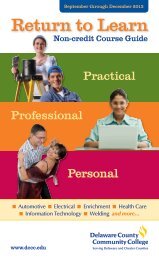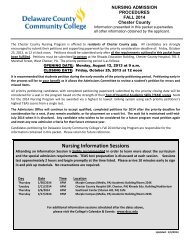2010 Catalog - Delaware County Community College
2010 Catalog - Delaware County Community College
2010 Catalog - Delaware County Community College
You also want an ePaper? Increase the reach of your titles
YUMPU automatically turns print PDFs into web optimized ePapers that Google loves.
COURSE DESCRIPTIONS 97<br />
CHE 201<br />
Organic Chemistry II<br />
The study of organic compounds containing oxygen and<br />
nitrogen. The structure, stereochemistry, reactions, and<br />
multistep synthesis of organic nitrogen and oxygen will be<br />
studied. Syntheses and instrumental analysis (IR and<br />
NMR) will be emphasized in the laboratory.<br />
Upon successful completion of this course, students<br />
should be able to:<br />
• Analyze organic compounds using spectroscopy.<br />
• Explain elimination and substitution reactions.<br />
• Describe the physical properties, stereochemistry,<br />
preparation, reactions and multistep synthesis of organic<br />
oxygen and nitrogen compounds.<br />
• Describe the general characteristics of carbohydrates,<br />
lipids and proteins.<br />
• Prepare compounds using complex syntheses.<br />
• Demonstrate a knowledge of scientific references and an<br />
ability to search the scientific literature.<br />
Prereq. CHE 200<br />
5 Credits 4 Weekly Lecture Hours<br />
3 Weekly Laboratory Hours<br />
(COMM) Communication Studies<br />
COMM 100 Introduction to<br />
Interpersonal Communication<br />
Students are introduced to the basic theories of interpersonal<br />
communication and their practical applications. Students<br />
also develop insights into managing conflict while learning<br />
how to build, maintain, and even end relationships in a<br />
productive manner. Given the social nature of communication,<br />
this course emphasizes experiential learning. Students<br />
should expect to be regularly engaged in classroom<br />
discussions, activities, and exercises. Academic writing<br />
serves to integrate learning in the classroom and off-campus.<br />
Upon successful completion of this course, students<br />
should be able to:<br />
• Recognize the function of human wants, needs, beliefs,<br />
and attitudes as they influence human communicative<br />
behavior.<br />
• Understand the importance of effective communication in<br />
intrapersonal, interpersonal, and small group settings.<br />
• Interact with two persons in and across a variety of faceto-face<br />
and mediated interactive contexts.<br />
• Apply foundational interpersonal skills such as active<br />
listening, self-disclosure, and trust building into their<br />
daily lives.<br />
• Understand the role of culture in human communicative<br />
behavior.<br />
• Identify and manage the multiple visual, verbal and<br />
nonverbal messages that constitute communication.<br />
• Identify and manage the interpersonal conflicts in<br />
professional, social, and personal relationships.<br />
Prereq. ENG 050 and REA 050 or pass test<br />
3 Credits 3 Weekly Lecture Hours<br />
COMM 102 Communication Across<br />
Cultures Special Studies<br />
This course focuses on interpersonal communication<br />
among and between people of different cultures. It is<br />
designed to introduce students to the basic concepts,<br />
theories, and research pertaining to intercultural communication.<br />
Students can also expect to engage in in-class<br />
exercises, activities, and discussions regarding everyday<br />
encounters with people from different socio-economic (class)<br />
backgrounds, racial, ethnicities, sexual orientations, gender,<br />
physical abilities and religious belief systems.<br />
Upon successful completion of this course, students<br />
should be able to:<br />
• Explain the interconnectedness of communication<br />
and culture<br />
• Describe various theoretical approaches to studying<br />
intercultural communication<br />
• Rcognize the influence of culture on identity formation<br />
and identity management<br />
• Analyze the wya that history (including political,<br />
intellectual, social, family, national, and cultural-group)<br />
informs an intercultural communication encounter<br />
• Discuss the role of language as the central element in<br />
intercultural communication<br />
• Identify and describe the nonverbal aspects of<br />
intercultural communication<br />
• Describe the characteristics of intercultural conflict<br />
Prereq. ENG 050 and REA 050 or pass test<br />
3 Credits 3 Weekly Lecture Hours<br />
COMM 104<br />
Introduction to Mass<br />
Communication<br />
This course introduces students to both the print and<br />
electronic media systems. Students will review the history<br />
of the mass media and explore career options in this field.<br />
They will also study the techniques of media analysis and<br />
consider the effects of the various media on society.<br />
Upon successful completion of this course, students<br />
should be able to:<br />
• Explain how the mass media have developed<br />
• Analyze the impact of print and electronic media<br />
upon society<br />
• Explain media forms.<br />
• Understand the conceptual differences between the media<br />
and their practical applications.<br />
• Assess the various career opportunities available in the<br />
mass communications field.<br />
Prereq. ENG 100<br />
3 Credits 3 Weekly Lecture Hours<br />
COMM 105 Small Group Communication<br />
A study of the techniques involved in effective group<br />
communication including: discussion, decision making,<br />
problem solving and resolving conflict in groups. Students<br />
learn theories of group dynamics and the nature of norms,<br />
goals, roles and leadership styles in small, task oriented<br />
groups. The class is a laboratory where students actively<br />
participate in structured group experiences requiring<br />
preparation and evaluation.<br />
Upon successful completion of this course, the student<br />
should be able to:<br />
• Identify the dynamics of effective group communication<br />
needed to maintain a small group<br />
• Identify and manage interpersonal conflicts in<br />
group settings<br />
• Recognize and identify differences in culture and<br />
communication styles as they apply to small group<br />
communication<br />
• Distinguish between defensive and supportive group<br />
communication climates<br />
• Recognize each of the following as they apply to small<br />
group communication: role, individual goal, group goal,<br />
norm, group cohension, and feedback<br />
• Explain the principles necessary to lead a discussion or<br />
group meeting<br />
• Participate productively in small group contexts<br />
Prereq. COMM 100 or consent of instructor<br />
3 Credits 3 Weekly Lecture Hours<br />
COMM 111<br />
Public Speaking<br />
This course enables students to speak before and in<br />
large and small groups. The course seeks to introduce<br />
students to the problems involved in providing information<br />
and persuading others. Organizational and research skills<br />
are stressed. Students can expect to present a minimum of<br />
five speeches.<br />
Upon successful completion of this course, students<br />
should be able to:<br />
• Define the concepts of "listener/audience needs."<br />
• Speak extemporaneously (with no or a minimum of<br />
notes), using effective voice, language and bodily action.<br />
• Locate appropriate materials (library, research,<br />
newspaper, journal, periodical, nonprint media,<br />
interviews) for the public-speaking occasion.<br />
• Organize ideas, opinions, facts, data requests into a message<br />
that will promote the desired response from the listeners.<br />
• Present a variety of public messages: information,<br />
persuasion, entertainment/after dinner/<br />
solicitation/inquiry/stimulation and analysis.<br />
• Evaluate as a listener speech messages; being able to<br />
distinguish between an effective and noneffective message.<br />
Prereq. ENG 050 and REA 050 or pass test<br />
3 Credits 3 Weekly Lecture Hours<br />
COMM 115<br />
Introduction to Public<br />
Relations<br />
This course treats public relations as communication-the<br />
process of organizations relating to their various "publics."<br />
Students explore the theory, principles and techniques of<br />
contemporary public relations as practiced in business,<br />
government, nonprofit and civic groups, cultural organizations,<br />
education and the community. Students prepare<br />
press releases, public service announcements, speeches,<br />
slide programs or other appropriate communication<br />
vehicles. For students in all curricula and programs.<br />
Upon successful completion of this course, students<br />
should be able to:<br />
• Describe public relations as a communication function<br />
of organizations.<br />
• List 10 basic principles of effective public relations.<br />
• Identify and describe career opportunities/possibilities<br />
within the student's field of study, interests or aptitude<br />
area in public relations.<br />
• Cite examples from the American past of public relations<br />
campaigns or principles that changed a "public's" view of<br />
an organization, a movement, an institution or a tradition.<br />
• Anticipate and analyze critical and negative views of<br />
public relations.<br />
• Identify the use of communicative art forms such as<br />
music, poetry, art, dance, film or story telling, in any<br />
public relations campaign mounted by a significant<br />
American organization.<br />
• Use, where appropriate, contemporary technology such<br />
as desktop publishing or computer software or slide and<br />
sound show or photography or student-produced video<br />
in designing a public relations campaign on a contemporary<br />
American problem, organization or movement.<br />
Prereq. ENG 050 and REA 050<br />
3 Credits 3 Weekly Lecture Hours<br />
COMM 200<br />
Argumentation and Debate<br />
To survive, compete, thrive and find success in an oftenturbulent<br />
modern world requires a sound working<br />
knowledge of the rules of persuasion and the ability to use<br />
the tools of verbal reasoning, logic and evidence to support<br />
one's position.<br />
Upon successful completion of this course, students<br />
should be able to:<br />
• Demonstrate that he/she can effect change through the<br />
use of persuasive skill.<br />
• Debate both the affirmative and the negative positions of<br />
a current controversial proposition.<br />
• Prepare a "brief" showing the supportable positions on<br />
any contemporary social, political or economic question.<br />
• Use the principles of library research and nonprint media<br />
to support their persuasive position.<br />
Prereq. COMM 111or permission of instructor<br />
3 Credits 3 Weekly Lecture Hours




